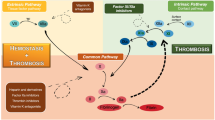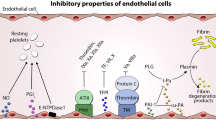Abstract
• Platelet function is critically important in the acute-care settings of cardiopulmonary bypass surgery and percutaneous coronary intervention, which are commonly associated with the adverse vascular events of hemorrhage and thrombosis, respectively.
• To improve outcomes, it has been suggested that patients should be screened for platelet count and function periprocedurally, and therapeutic intervention including the possible use of thrombolytics and adequate anticoagulation or administration of antiplatelet agents, should be utilized.
• Antiplatelet therapy including aspirin (acetylsalicylic acid), the thienopyridines (clopidopgrel), and parenteral anti-glycoprotein (GP) IIb/IIIa agents (abciximab, tirofiban, and eptifibatide) are recognized as clinically important in patients at risk of developing thrombotic events.
• Recently, it has been recognized that empiric therapeutic administration of these agents may be suboptimal in clinical environments because of interpatient variability with regard to platelet count, platelet response, receptor concentration on the platelet, and other factors. Hence there is a clinical need to monitor such therapies on an individual basis.
• Traditional platelet tests including light transmission aggregometry (LTA) are inconvenient for acute diagnostic testing because of the complexity of the test and the requirement for specialty training. Hence, ‘near-patient’ test systems have recently been introduced.
• Plateletworks® is an in vitro diagnostic, point-of-care test platform that has demonstrated utility in monitoring platelet response to all current antiplatelet agents including aspirin and clopidogrel.
Similar content being viewed by others
References
Harker LA, Mann KG. Thrombosis and fibrinolysis. In: Fuster V, Verstraete M, editors. Thrombosis in cardiovascular disorders. Philadelphia (PA): WB Saunders, 1992: 1–16
Badimon L, Badimon JJ, Fuster V. Pathogenesis of thrombosis. In: Fuster V, Verstraete M, editors. Thrombosis in cardiovascular disorders. Philadelphia (PA): WB Saunders, 1992: 17–39
Sughayer M, Arkin CF. Monitoring coagulation during and after cardiopulmonary bypass surgery. Thromb Hemost 1990; 12(4): 1–7
Steinhubl S, Talley DJ, Braden GA, et al. Point-of-care measured platelet inhibition correlates with a reduced risk of an adverse cardiac event after percutaneous coronary intervention: results of the GOLD (AU-Assessing Ultegra) Multicenter Study. Circulation 2001; 103: 2572–8
Woodman RC, Harker LA. Bleeding complications associated with cardiopulmonary bypass. Blood 1990; 76: 1680–97
Berkowitz SD, Harrington RA, Rund MM, et al. Acute profound thrombocytopenia after c7E3 Fab (abciximab) therapy. Circulation 1997: 95; 809–13
Ammar T, Scudder LE, Coller BS. In vitro effects of the platelet glycoprotein IIb/ IIIa receptor antagonist c7E3 Fab on the activated clotting time. Circulation 1997; 95: 614–7
Califf RA, Willerson JT. Percutaneous transluminal coronary angioplasty: prevention of occlusion and restenosis. In: Fuster V, Verstraete M, editors. Thrombosis in cardiovascular disorders. Philadelphia (PA): WB Saunders, 1992: 389–408
Anderson HV, Jordan RE, Weisman HF. Concept and clinical application of platelets glycoprotein IIb/IIIa inhibition with abciximab (c7E3 Fab; ReoPro) for the prevention of acute ischemic syndromes. Clin Appl Thromb Hemost 1997; 3(4): 256–66
Anti-Platelet Trialists Collaboration. Collaborative overview of randomized trials of anti-platelet therapy: I. Prevention of death, myocardial infarction and stroke by prolonged anti-platelet therapy in various categories of patients. BMJ 1994; 308: 81–91
Moliterno DJ, Califf RM, Aguirre FV, et al. Effect of platelet glycoprotein IIb/IIIa integrin blockade on activated clotting time during percutaneous transluminal coronary angioplasty or directional atherectomy (the EPIC) trial. Am J Cardiol 1995; 75: 559–62
Moliterno DJ, Topol EJ. Conjunctive use of platelet glycoprotein IIb/IIIa antagonist and thrombolytic therapy for acute myocardial information. Thromb Haemost 1997; 78: 214–9
Campbell FW, Addonzio VP. Platelet function alterations during cardiac surgery. In: Ellison N, Jobes DR, editors. Effective hemostasis in cardiac surgery. 1st ed. Philadelphia (PA): WB Saunders, 1988: 85–109
Despotis GJ, Santoro SA, Spitznagel E, et al. Prospective evaluation and clinical utility of on-site monitoring of patients undergoing cardiac operation. J Thorac Cardiovasc Surg 1994; 107: 271–9
Born GVR, Cross MJ. The aggregation of blood platelets. J Physiol 1963; 168: 178–95
Born GVR, Hardisty RM. Platelets. In: Biggs R, editor. Human blood coagulation haemostasis and thrombosis. 2nd ed. London: Blackwell Scientific Publications, 1976: 168–201
Storey RF, Wilcox RG, Hepinstall S. Differential effects of glycoprotein GPIIb/ IIIa antagonists on platelet microaggregate and macroaggregate formation and effect of anticoagulant on antagonist potency. Implications for assay methodology and comparison of different antagonists. Circulation 1998; 98: 1616–21
Podczasy JJ, Lee J, Vucenik I. Evaluation of whole-blood lumiaggregation. Clin Appl Thromb Hemost 1997; 3: 190–5
Dade PFA-100™. Platelet function analyzer [technical information; online]. Available from URL: http://www.dadebehring.com/edbna2/ebusiness/products/productDetail.jsp?PROD_OID=76320&FEATURED_PROD=Y [Accessed 2008 Mar 27]
Smith JW, Steinhubl SR, Lincoff AM, et al. Rapid platelet-function assay: an automated and quantitative cartridge-based method. Circulation 1999; 99: 620–5
Carville DGM, Schleckser PA, Guyer KE, et al. Whole blood platelet function assay on the ICHOR point-of-care hematology analyzer. J Extra Corpor Technol 1998; 30(4): 171–7
Lau WC, Waskell LA, Neer CJ, et al. The effect of drugs which are known inducers and inhibitors of human cytochrome P450 3 A on the platelet inhibitory activity of clopidogrel. Am J Cardiol 2002; 39(5): 235A
Lau WC, Walker CT, Ogilby JD, et al. Evaluation of a near patient platelet function assay: performance and clinical utility. Ann Cardiac Anaesth 2002; 5: 33–42
Lau WC, Waskell LA, Watkins PB, et al. Atorvastatin reduces the ability of clopidogrel to inhibit platelet aggregation: a new drug-drug interaction. Circulation 2003; 107: 32–7
Guyer KE, Carville DGM, Lau WC. Platelet protection using the glycoprotein IIb/ IIIa inhibitor tirofiban in a patient with heparin induced thrombocytopenia undergoing aortic valve replacement requiring cardiopulmonary bypass. Point Care 2003; 2(2): 119–24
Lau WC, Gurbel PA, Bliden KP, et al. St John’s wort enhances clopidogrel responsiveness in clopidogrel resistant volunteers and patients by induction of CYP3A4 isoenzyme [abstract no. 1008-121]. J Am Coll Cardiol 2007; 49(9): 343A
Lau WC, Neer CJ, Watkins PB, et al. Clopidogrel non-responders discovered during point-of-care platelet aggregation testing. J Am Coll Cardiol 2003; 41(6) Suppl. A: 1009–117
Lau WC, Hallock L, Carville DGM, et al. The primary in vivo metabolic activation of clopidogrel is by hepatic and not enterocytic cytochrome P450 3A4 isoenzyme [abstract no. 1008-119]. J Am Coll Cardiol 2007; 49(9): 343A
Guyer KE, Carville DGM, Ridgway HR, et al. Point-of-care monitoring for optimal anti-platelet therapy in acute clinical settings. Point Care 2007; 6(3): 209–12
Gurbel PA, Bliden KP, DiChiara J, et al. Evaluation of dose-related effects of aspirin on platelet function: results from the ASpirin-induced Platelet EffeCT (ASPECT) study. Circulation 2007; 115: 3156–64
Geske FJ, Guyer KE, Ens G. AspirinWorks®: a new immunologic diagnostic test for monitoring aspirin effect. Mol Diagn Ther 2008; 22(1); 51–4
Acknowledgments
James Campbell and Helen Ridgway are employees of Helena Laboratories, the manufacturer of Plateletworks®, and David Carville serves as a consultant for the company.
Author information
Authors and Affiliations
Corresponding author
Rights and permissions
About this article
Cite this article
Campbell, J., Ridgway, H. & Carville, D. Plateletworks®. Mol Diag Ther 12, 253–258 (2008). https://doi.org/10.1007/BF03256290
Published:
Issue Date:
DOI: https://doi.org/10.1007/BF03256290





